What Will it Cost? How to Decide Between Traditional or Alternative Housing
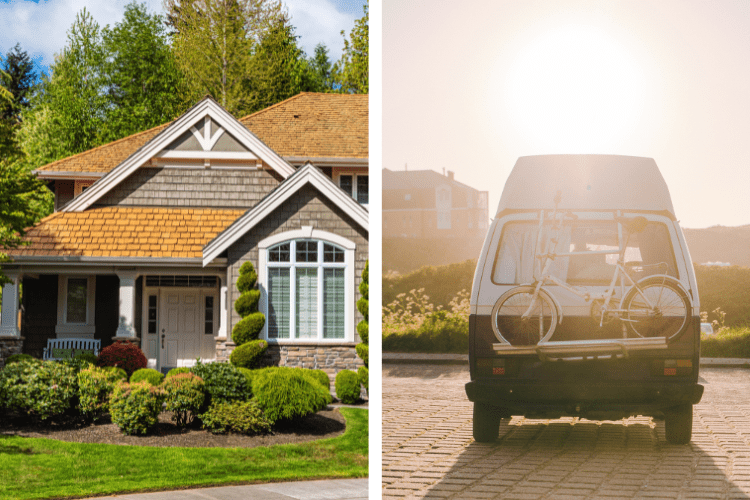
Many are still entering the housing market, hoping to settle into traditional homes. Others are turning to less traditional—even semi-nomadic—creative housing options to support their needs.
If you’re wondering where your next home should be, we have some financial considerations for you to make when choosing!
Traditional Housing
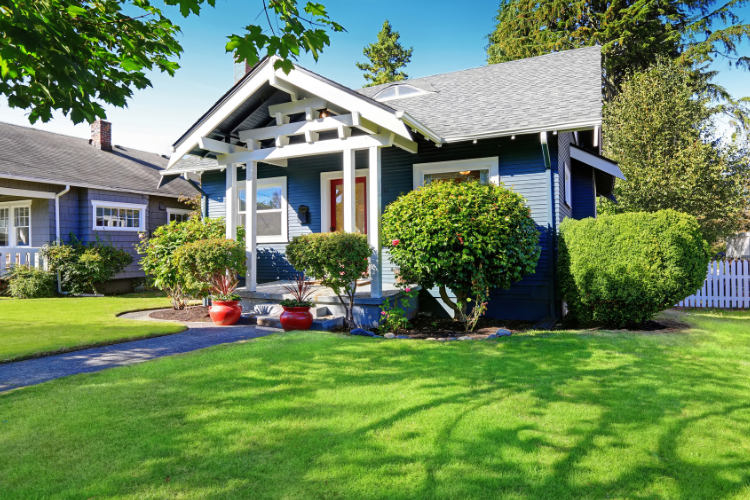
Despite industry chatter, down payments on houses are usually less than 20%. Per the National Association of Realtors’ ongoing research, repeat buyers put 17% down, and first-timers only pay 6 – 7%. Regardless of smaller down payments, prospective buyers will still need the funds to afford:
- Preapproval for a mortgage
- Hiring a Realtor
- Home inspection costs
- Monthly mortgage payments (premium + interest)*
- Homeowners Insurance*
- Home warranties*
- Closing costs*
*If selected for the home
Between the availability of houses on the market and the typical work needed to make them fully liveable, you need to consider what big-ticket items and services you need to purchase as necessary tools for continued maintenance. Lawnmowers, snow removal, garbage services, and repair tools can add up to thousands of dollars depending on where you live and what your climate and city require. Moreover, this doesn’t account for taxes, utilities, water, Wi-Fi, cable, or phone bills that will automatically cost you extra monthly or quarterly.
The upsides to traditional housing shouldn’t go unmentioned, especially when discussing long-term finances. When looking to purchase, there’s a lot of flexibility in loans available to buyers. Depending on your financial health and goals moving forward, fixed loans give you a designated number of years to pay back your mortgage with set interest rates and payments. FHA loans are easier to qualify for and serve those with higher debt and lower credit scores. They also come with lower down payment requirements.
What’s more, once your mortgage is paid off, the home is yours! From day one, you can build its equity for potential resale or leasing, or you can settle down and enjoy it as a lifetime project that gives you a home base to return to. This is an especially great option for families looking to pass their property down through the generations.
RV Accommodations
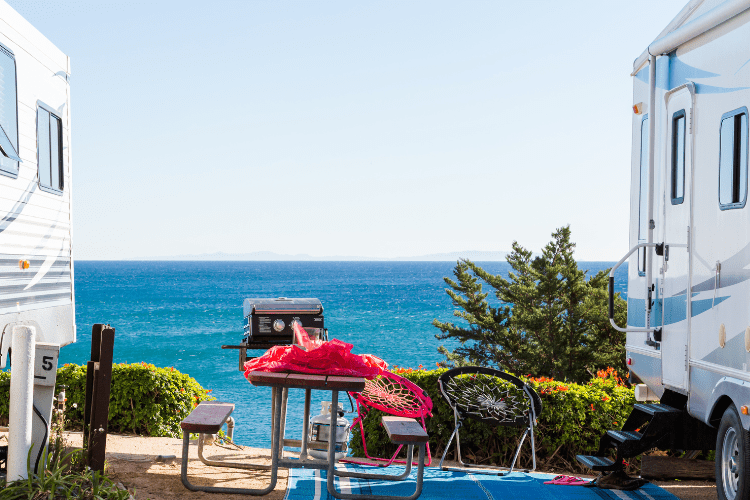
According to KOA.com, RVs can be financed but aren’t typically leased due to a vehicle’s immediate depreciation. Between purchase and travel, startup costs alone include:
- Monthly financing rates
- Insurance
- Registration
- Tax
- Fuel
- 2+ energy sources (propane, lithium batteries, solar)
- Emergency power source
- Properties/camps to stay at
- Grey water and waste removal
- Food & supply provisions for travel
This doesn’t account for any customization or repair that the vehicle may need.
The less you spend on an RV, the less you have to work with in terms of space, convenience, and basic amenities, but it’s worth noting that the lifestyle generally requires some adjusting.
The pros of converting to RV life include a larger opportunity to pay the vehicle off sooner than a typical mortgage if you choose to finance. They can support remote work, digital nomading, families on the road, and fulfilling travel experiences you might not otherwise receive. RVs are flexible to your family’s size and lifestyle needs and can be owned in conjunction with a house or other property.
Van Living
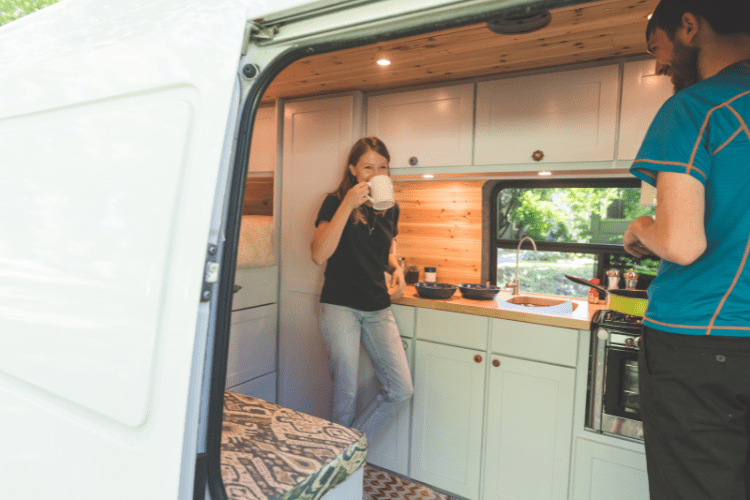
Regarding housing trends, van life during the pandemic has skyrocketed as an opportunity to minimize one’s lifestyle, hit the road, and even work as a digital nomad. Often, people purchase utility vans or decommissioned school buses to strip and customize to their wants and storage needs, though this can become a lengthy and expensive DIY.
The costs associated with camper vans will often reflect those of an RV, though the most substantial can present themselves in remodeling and converting. With the conversion market still relatively niche, you’ll need to buy or rent tools and services for demolition and reconstruction. The larger your project, the higher your need for specialized design, potentially through CAD software. Smaller conversions might get away with simple additions versus custom plumbing, electrical, and appliance fittings.
An important thing to note, especially when you’re looking to minimize costs, is to be aware of the things that will lower the fuel consumption of your van or bus to increase its lifespan. By converting these vehicles, you need to be conscious of the weight you’re adding and its driveability. More weight and/or erratic driving will use more fuel and lower the lifetime of your vehicle.
When done right, van life can come with several advantages. It’s a great way to practice compact traveling and minimalist living. It can be a practical arrangement for those who work remotely and want to travel or for college kids who want to avoid room and board fees while moving around on their breaks. Vans are easy to equip with safety features for solo travelers and can accommodate pets on their adventures.
Renting
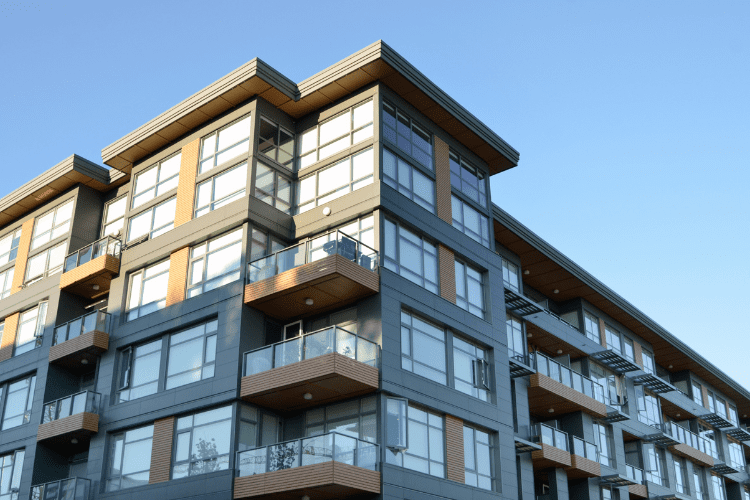
Whether you rent a home or apartment the traditional way or choose a more alternative option like Airbnb hopping, renting can be a great fit or an expensive move.
Costs to consider – financial or otherwise – include:
- Application fees range from $0 to thousands of dollars
- Security deposit (usually equal to one month’s rent)
- First month’s rent
- Last month’s rent (potentially)
- Credit check (possibly included in the application fee)
- Background check
- Proof of pay from an employer
- Co-signer
- References
- Signing on for a full year (exception: Airbnb, long-stay hotels, short-term housing)
- Renter’s insurance (landlords usually require a certain amount of coverage)
Additional costs could include water, heat, electricity, Wi-Fi, cable, phone, garbage removal, and snow removal, depending on what’s included in the rent, your needs, and how you can bundle certain expenses.
Renting can be a hit or a miss, especially if you’re staying in a complex where you’re more likely to be affected by other people’s noise and lifestyle. Top-floor apartments will usually be more expensive than lower units, depending on the view, accessibility, and how sound transfers between levels. What’s more, rent freezes were dropped after the pandemic, and lease prices are now skyrocketing, which could add hundreds or even thousands of dollars if you re-sign to an unfixed agreement. In many places, people find themselves paying amounts comparable to mortgage rates and have to decide if it’s more worthwhile to settle in one space or have the ability to move around. Digital nomads hopping rentals and Airbnbs on a shorter basis will also have to absorb the costs of travel and vehicle wear.
The advantages of renting aren’t to be overlooked, though. If you keep your space properly according to your lease, you will likely receive your security deposit back in full when you move out. Landlords are often flexible to contract lengths after you’ve stayed for a year, sometimes allowing for half-year or month-to-month signings (these might cost more in rent). There is certainly greater flexibility here than homeownership, and the added costs are things you’re likely to find with any living situation. Leaks, breaks, and repairs are the property manager’s responsibility, saving you the time and money needed for tools and servicing. What’s more, Airbnb hoppers can get their travel fill while still having spaces to spread out and ground themselves where they are.
The Bottom Line
Whichever lifestyle you choose, it’s important to do what’s best for you and your financial future. Some ditch traditional housing to save money, while others have found that alternative housing creates just as much expense. It’ll be up to you to live within your means, balance short-term and long-term costs, and exist safely to truly enjoy the fruits of your labor!
Read More:










